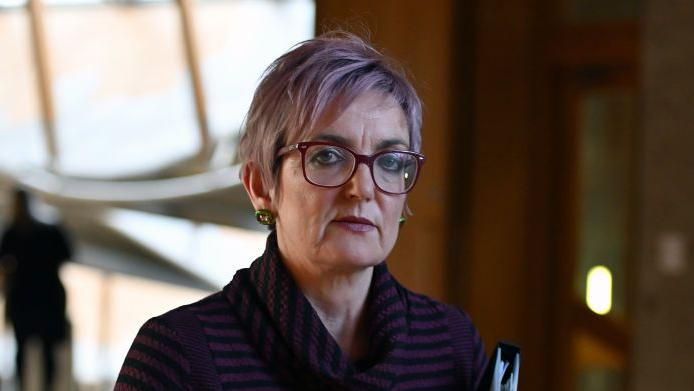Juryless rape trials plan could be modified

Angela Constance said there was compelling evidence that rape myths may influence jurors' decisions
- Published
The Scottish government may modify plans for a pilot of trials without juries in rape cases.
It also announced that the pilot project would not take place until late 2028, after the next Holyrood election.
The Victims, Witnesses and Justice Reform (Scotland) Bill contains proposals for a pilot where a single judge would decide the verdict in rape or attempted rape trials.
But the government's justice secretary, Angela Constance, said she was willing to "explore" how a panel of decision makers could replace the single-judge model, external.
She was speaking following opposition from much of the legal profession, who have warned the scheme could undermine the judicial system.
MSPs are also split over the proposals.
'Rape myths'
She made the comments in a written response to Holyrood's Justice Committee, which has been scrutinising the legislation.
Ms Constance said there were "particular advantages" in adopting a system where a professional judge sat alongside two members of the public.
She said this approach "would increase the diversity of decision-makers hearing cases".
She also said there was a "compelling body of evidence" that rape myths and preconceptions about how people who have been raped should behave may influence jurors' decisions.
For example, many people "freeze" rather than fight back when subjected to a sexual assault, which some jurors may not expect.
The Scottish government could also consider using a panel of judges, rather than a single judge, she said.
A document released by the government setting out an indicative timeline for the pilot said it would not take place until the last quarter of 2028.
She said this assumption was based on the bill passing later this year, and would then be contingent on further discussions with other stakeholders as well as the availability of resources to run the pilot.
The next Scottish Parliament election is due to take place in May 2026, meaning a new government will have been elected by then.
Pilot 'doomed'
The Law Society of Scotland has said trial by jury for serious crimes was a "basic right" and called for the pilot to be scrapped.
Simon Brown, of the Scottish Solicitors Bar Association (SSBA), the organisation representing criminal defence solicitors, said he was surprised that the government was proceeding with the pilot given the "clear misgivings" of the Justice Committee.
He said the government was also ignoring the "deep-seated opposition of almost the entire legal profession", adding that there was "virtually unanimous refusal to take part in such trials".
Without the participation of the criminal bar, he said the pilot was "doomed before it start[ed]".
On the plan to use a panel of judges or a judge and two members of the public, he said he was "sceptical", because this plan failed to address the fundamental issue with the pilot, which he said was that it "dispenses with the huge variety of real life experiences juries bring to the process".
He also highlighted that there were not enough judges to staff panels, with cases already taking years to come to court and no funding available for additional judges.
Mr Brown continued that the plan to replace jurors with two members of the public sitting with a judge made "no sense", adding that this was just replacing 15 jurors with two.
The proposals have also proved controversial with MSPs, including some SNP backbenchers.
Scottish Conservative justice spokesman Russell Findlay said the Scottish government was making it up as they went along, having previously said there was "no credible evidence" to support rape trials without juries.
Low conviction rates
However, supporters believe the move could improve the low conviction rate in rape cases.
The most recent statistics from the Scottish government showed that the overall conviction rate for rape and attempted rape was 48%, external, compared to 84% for crimes overall.
Sandy Brindley, Rape Crisis Scotland's chief executive, said survivors were being let down by the justice system, and that the current jury system played a significant part in this.
Ms Brindley continued: "There is overwhelming evidence about the impact of rape myths on jury decision making. These are deeply ingrained views about what a ‘real’ rape is or how a ‘real’ victim would look or behave."
“The Scottish government is right to explore different models and options to try to build consensus on the best way of ensuring the integrity of decision making in rape cases", she added.
However, she said she was "disappointed to see the lengthy timelines indicated before any change will actually be implemented".